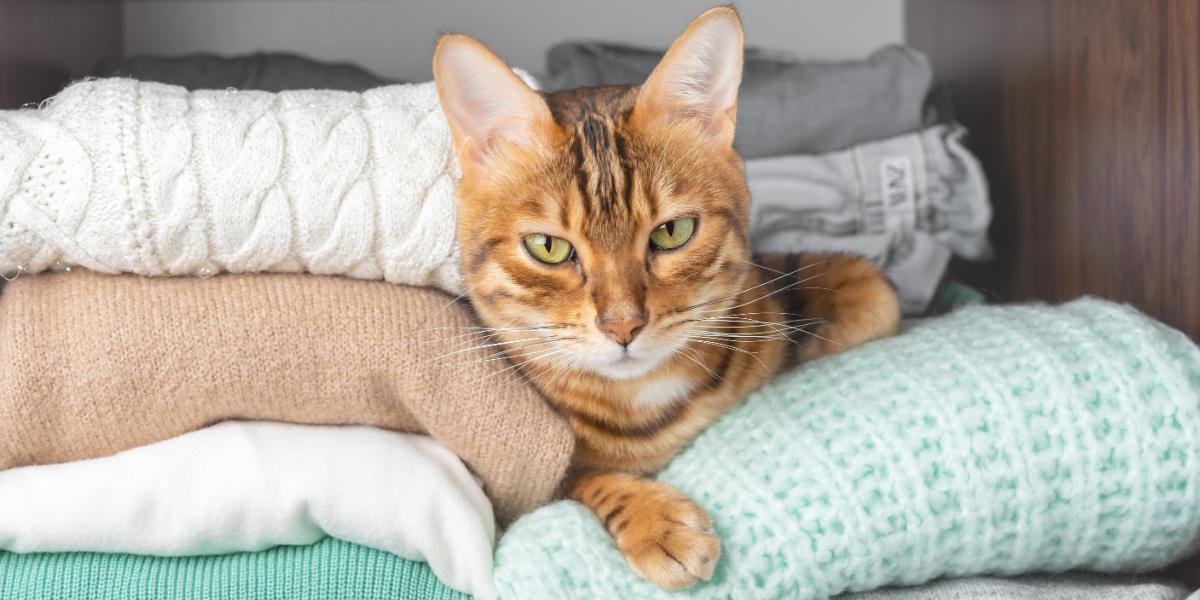
Any cat parent will have had times where they find their cat hidden away somewhere strange, perhaps on top of the bookcase, under the bed, or even behind the curtains. For many cats, this hiding behavior is part of a natural behavioral drive, but did you know that hiding away can also signify a problem with your cat?
Quick Overview
Some cats naturally choose warm, dark, quiet spots to hide away when they are sleeping.
If your cat is hiding away more than usual, it can mean your cat is experiencing fear, stress, pain, or a medical illness.
Any behavioral change in your cat, including hiding away, should always prompt a trip to your veterinarian for a checkup.
Knowing what feline behavior is normal is important so you can get a veterinary checkup if you notice anything is out of the ordinary. Read on to learn what hiding behavior can tell you about your cat and how you can help.
What Drives Hiding Behavior in Cats?
When you think of a wild cat, you probably imagine a calculating predator with a wicked hunting instinct. This isn’t wrong. Even domesticated cats are fantastic hunters as this is how they find food in the wild.
However, did you know that cats are also prey animals? This means that they instinctually have many self-preservation behaviors to keep them safe from the animals that hunt them, such as foxes or coyotes. One such crucial evolutionary behavior is that of seeking out a hiding place.
Why Is My Cat Hiding?
There are many different reasons that a cat might choose to hide away. These include:
1. Warmth
Cats are naturally drawn to areas of warmth. The hours spent sunbathing or snuggled up on your lap are a testament to this. This heat-seeking behavior is partly due to their small size. Although fur makes for a fantastic insulator, animals with smaller body sizes have a larger surface-area-to-volume ratio, so they lose heat more readily than larger animals. Cats also seek warmth purely to be comfortable and cozy, like us.
2. Security
As cats are natural prey animals, finding hidden sleeping spots can give them a sense of security, allowing them to be more relaxed. The need to seek out a hiding spot to snooze will depend a lot on your cat’s character; more outgoing cats, or those that feel very secure in their home environment, often quite happily snuggle up very much in the public eye.
However, if your cat always seeks out a safe spot for their periods of sleep, this might be very normal behavior for them.
3. Fear
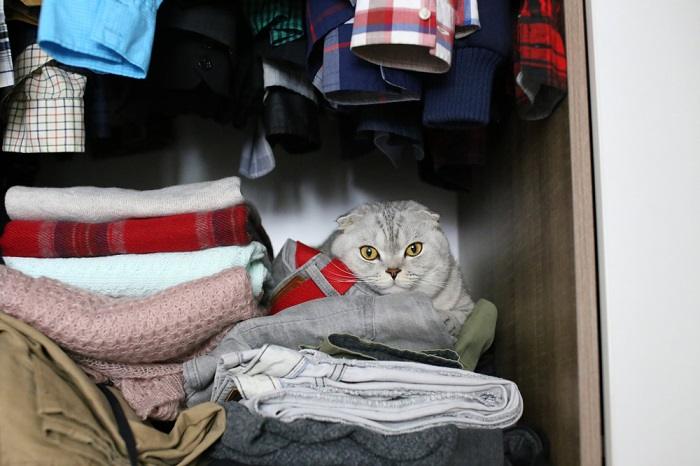
When cats feel afraid, it’s natural for them to hide from the thing or sounds that are stressing them.
Cats can exhibit fear behavior for many reasons, and we as humans may not even notice the things that are very scary for them. Something as simple as the vacuum or the clothes dryer running might make your cat feel scared. Loud noises or erratic behavior (such as that exhibited by exuberant or young children) can be enough to send your cat running for a space where they feel safe.
4. Stress
Cats are naturally very sensitive to stress and anxiety. Stress can manifest in many ways, including behavioral changes, over-grooming, inappropriate toileting behavior, and hiding away. The cause of stress for a cat can sometimes be extremely subtle, such as a minor change in social dynamics between cats in a multi-cat household, home renovations, or even just seeing a new cat out of the window.
Even basic changes within their territory such as new furniture or a new scent can be stressful. Managing stress behavior in cats can, at times, be challenging. Still, your veterinarian can advise on the best course of action if you think your cat suffers from stress or anxiety at home. Look out for behavior changes or alterations in litter box use.
5. Pain
Since cats are naturally prey animals, when they are experiencing pain, they might choose to hide. Pain can be hard to recognize in cats because they tend to mask it very well until such a time they are unable to continue hiding it.
Many conditions are painful for cats, but a common presenting complaint is arthritis or joint inflammation. Cats will not typically present with overt lameness, but instead might become less active, reluctant to jump up onto high surfaces, or hide away more. Learn more about arthritis here.
Similarly, dental disease is common in cats and can be painful. Counterintuitively, your cat will be unlikely to go off their food until their teeth are terrible. Instead, they might simply hide more than usual. If you notice your cat is hiding or sleeping more than usual, it might be a sign of pain, and making an appointment with your veterinary clinic is a sensible plan.
6. Illness
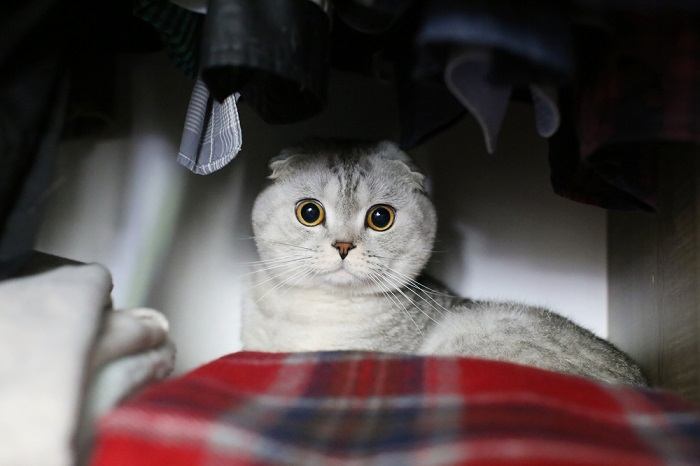
As with cats suffering from pain, a sick cat is likely to hide rather than display signs of illness.
Similarly to painful conditions, if your cat is feeling under the weather, they might start to hide away from you more than usual. Many conditions can make your cat feel poorly, but common complaints include liver, kidney, heart, lung disease, and cancers. The signs of illness can be varied but hiding away is often a common factor.
To understand what is wrong with your pet, your veterinarian will take a thorough history and examination of your cat. Based on this, your vet can then recommend specific testing tailored to your cat’s need to get to the bottom of what is making them sick and advise on appropriate treatments.
Why Is My Cat Hiding in the Closet Specifically?
The linen closet might seem a strange place for your cat to want to hide, but in fact, it is generally a warm, quiet, and dark place. Therefore, it makes for a very attractive hiding spot, regardless of the reason driving your cat’s need to hide away.
Should I Be Worried My Cat Has Started Hiding Away?
If your cat has had a sudden behavior change, this can mean that something is wrong. Behavioral changes in cats can result from pain, illness, or genuine behavioral problems. It is essential to speak to your veterinarian if you notice your cat has had a behavior change.
They can carry out a comprehensive assessment and any necessary tests to ensure your cat has a clean bill of health. If nothing medical is wrong with your cat, your vet can then provide you with behavioral recommendations or refer you to a licensed veterinary behaviorist who will be able to provide specific advice to help your cat.
Always be cautious about assuming what is wrong with your cat based on reading articles online or speaking to unlicensed behaviorists. Cats are very complex creatures, and taking the wrong advice can worsen the problem.
Final Thoughts
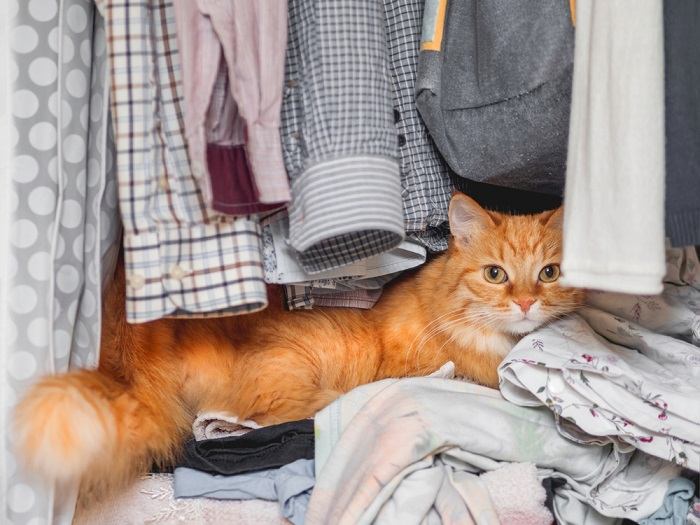
If your cat has always chosen to sleep in your closet, it’s likely they just enjoy the peace, quiet, warmth, and darkness of that space.
It might be a normal for your cat to hide in your closet and sleep. However, hiding away and sleeping more than usual can signal that something isn’t right. Therefore, if you ever notice a change in your cat’s behavior, it is worth seeking advice from your veterinary clinic.
At best, they can put your mind at ease that nothing is out of the ordinary. However, if something is wrong, they can help get to the bottom of the issue and hopefully get your cat back to feeling on top form and enjoying their snoozes in comfort.
Related Symptoms:
- 5 Visual Signs Of A Stressed Cat And How To Help
- Osteoarthritis In Cats: Causes, Symptoms, & Treatment
- 8 Ways To Help a Scared and Fearful Cat Be Confident
Frequently Asked Questions
Why is my cat sleeping and hiding?
Cats love to snooze, and your cat's new favorite sleeping spot might be tucked away in a hidden, quiet location in the house. However, if your cat is suddenly sleeping more than usual, hiding away, or has other changes to her typical behavior pattern, it could mean something is wrong. You can always speak to your veterinarian if you are worried about your cat’s behavior.
Why would a cat suddenly start hiding?
If a normally social cat suddenly starts to hide away, it can mean they are frightened, stressed, or unwell.
Why does my cat want go in the closet?
It might mean several things if you have noticed your cat suddenly wanting to hide in your closet. It might simply be they have found a cozy new favorite spot for their afternoon snooze; however, suddenly wanting to hide can also be a sign of fear, pain, illness, or stress in cats. Any sudden behavior change should prompt a trip to your local veterinary clinic.
 Fact checked by
Fact checked by


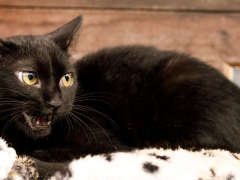

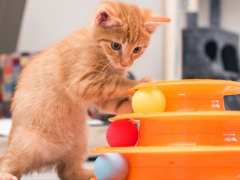
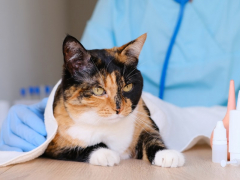


My cat Clok is 16. He had a tumor removed from his behind and vet said he is cancer free. He has arthritis in his back legs, and has difficulty walking. He stays in my closet all the time now, eating and drinking very little. He seems happy enough, but he can’t continue to live this way. Should I force him out of the closet? I believe he is just biding his time until he is off to kitty heaven.
I would not necessarily force him to come out of the closet—it sounds like this is where he feels comfortable now. I would look into some supplementation or treatment for his arthritis, as it sounds like this may be the main source of discomfort now. Other than that, you can only do your best to keep him comfortable. I’m sorry you’re going through this with Clok. Wishing you all the best!
Thank you for your advice. That is what I want to do, but being pushed by friends to take him out of the closet and make him socialize with other other cats. I have had cats in my life for 68 years, so think I know a little about them lol. He comes out to eat, drink and go potty. He just feels comfortable among all the sweatshirts he pulled off the hangers. I do have gabapentin for his pain and he is on cosequin. I think he is happy as possible considering the painful arthritis. I’m going to leave him comfortable where he is.